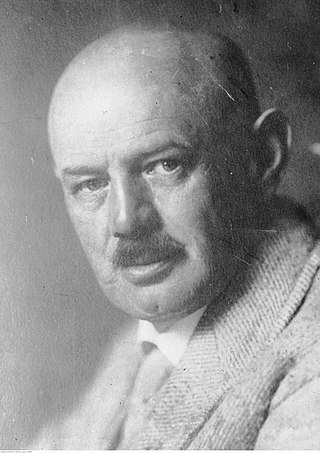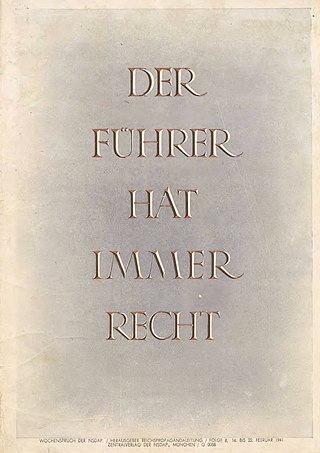
Triumph of the Will is a 1935 German Nazi propaganda film directed, produced, edited and co-written by Leni Riefenstahl. Adolf Hitler commissioned the film and served as an unofficial executive producer; his name appears in the opening titles. It chronicles the 1934 Nazi Party Congress in Nuremberg, which was attended by more than 700,000 Nazi supporters. The film contains excerpts of speeches given by Nazi leaders at the Congress, including Hitler, Rudolf Hess and Julius Streicher, interspersed with footage of massed Sturmabteilung (SA) and Schutzstaffel (SS) troops and public reaction. Its overriding theme is the return of Germany as a great power with Hitler as its leader. The film was produced after the Night of the Long Knives, and many formerly prominent SA members are absent.

The Night of the Long Knives, or the Röhm purge, also called Operation Hummingbird, was a purge that took place in Nazi Germany from 30 June to 2 July 1934. Chancellor Adolf Hitler, urged on by Hermann Göring and Heinrich Himmler, ordered a series of political extrajudicial executions intended to consolidate his power and alleviate the concerns of the German military about the role of Ernst Röhm and the Sturmabteilung (SA), the Nazis' paramilitary organization, known colloquially as "Brownshirts". Nazi propaganda presented the murders as a preventive measure against an alleged imminent coup by the SA under Röhm – the so-called Röhm Putsch.

The Beer Hall Putsch, also known as the Munich Putsch, was a failed coup d'état by Nazi Party leader Adolf Hitler, Generalquartiermeister Erich Ludendorff and other Kampfbund leaders in Munich, Bavaria, on 8–9 November 1923, during the Weimar Republic. Approximately two thousand Nazis marched on the Feldherrnhalle, in the city centre, but were confronted by a police cordon, which resulted in the deaths of 16 Nazi Party members and four police officers.

The Thule Society, originally the Studiengruppe für germanisches Altertum, was a German occultist and Völkisch group founded in Munich shortly after World War I, named after a mythical northern country in Greek legend. The society is notable chiefly as the organization that sponsored the Deutsche Arbeiterpartei, which was later reorganized by Adolf Hitler into the National Socialist German Workers' Party. According to Hitler biographer Ian Kershaw, the organization's "membership list ... reads like a Who's Who of early Nazi sympathizers and leading figures in Munich", including Rudolf Hess, Alfred Rosenberg, Hans Frank, Julius Lehmann, Gottfried Feder, Dietrich Eckart, and Karl Harrer.

Dietrich Eckart was a German völkisch poet, playwright, journalist, publicist, and political activist who was one of the founders of the German Workers' Party, the precursor of the Nazi Party. Eckart was a key influence on Adolf Hitler in the early years of the Party, the original publisher of the party newspaper, the Völkischer Beobachter, and the lyricist of the first party anthem, Sturmlied. He was a participant in the failed Beer Hall Putsch in 1923 and died on 26 December of that year, shortly after his release from Landsberg Prison, from a heart attack.

Charles Edward was the last sovereign duke of Saxe-Coburg and Gotha, from 30 July 1900 until 1918. A male-line grandson of Queen Victoria and Prince Albert, he was also until 1919 a Prince of the United Kingdom and from birth held the British titles of Duke of Albany, Earl of Clarence and Baron Arklow.

The Führerprinzip prescribed the fundamental basis of political authority in the Government of Nazi Germany. This principle can be most succinctly understood to mean that "the Führer's word is above all written law" and that governmental policies, decisions, and offices ought to work toward the realization of this end. In actual political usage, it refers mainly to the practice of dictatorship within the ranks of a political party itself, and as such, it has become an earmark of political fascism. Nazi Germany aimed to implement the leader principle at all levels of society, with as many organizations and institutions as possible being run by an individual appointed leader rather than by an elected committee. This included schools, sports associations, factories, and more. Nazi propaganda often focused on the theme of a single heroic leader overcoming the adversity of committees, bureaucrats and parliaments. German history, from Nordic sagas to Frederick the Great and Otto von Bismarck, was interpreted to emphasize the value of unquestioning obedience to a visionary leader.
The association of Nazism with occultism occurs in a wide range of theories, speculation, and research into the origins of Nazism and into Nazism's possible relationship with various occult traditions. Such ideas have flourished as a part of popular culture since at least the early 1940s, and gained renewed popularity starting in the 1960s. Historian Nicholas Goodrick-Clarke analyzed the topic in his 1985 book The Occult Roots of Nazism, in which he argued there were in fact links between some ideals of Ariosophy and Nazi ideology. He also analyzed the problems of the numerous popular occult historiography books written on the topic. Goodrick-Clarke sought to separate empiricism and sociology from the modern mythology of Nazi occultism that exists in many books which "have represented the Nazi phenomenon as the product of arcane and demonic influence". He evaluated most of the 1960 to 1975 books on Nazi occultism as "sensational and under-researched".

Armanism and Ariosophy are esoteric ideological systems that were largely developed by Guido von List and Jörg Lanz von Liebenfels respectively, in Austria between 1890 and 1930. The term 'Ariosophy', which means the wisdom of the Aryans, was invented by Lanz von Liebenfels in 1915, and during the 1920s, it became the name of his doctrine. For research on the topic, such as Nicholas Goodrick-Clarke's book The Occult Roots of Nazism, the term 'Ariosophy' is generically used to describe the Aryan/esoteric theories which constituted a subset of the 'Völkische Bewegung'. This broader use of the word is retrospective and it was not generally current among the esotericists themselves. List actually called his doctrine 'Armanism', while Lanz used the terms 'Theozoology' and 'Ario-Christianity' before the First World War.

Der Sieg des Glaubens is the first Nazi propaganda film directed by Leni Riefenstahl. Her film recounts the Fifth Party Rally of the Nazi Party, which occurred in Nuremberg, Germany, from 30 August to 3 September 1933. The film is of great historic interest because it shows Adolf Hitler and Ernst Röhm on close and intimate terms, before Hitler had Röhm shot during the Night of the Long Knives on 1 July 1934. As he then sought to erase Röhm from German history, Hitler required all known copies of the film to be destroyed, and it was considered lost until a copy turned up in the 1980s in East Germany.

Adolf Hitler's rise to power began in the newly established Weimar Republic in September 1919 when Hitler joined the Deutsche Arbeiterpartei. He rose to a place of prominence in the early years of the party. Being one of its best speakers, he was made the party leader after he threatened to otherwise leave.
A census in May 1939, six years into the Nazi era and after the annexation of mostly Catholic Austria and mostly Catholic Czechoslovakia into Germany, indicates that 54% of the population considered itself Protestant, 41% considered itself Catholic, 3.5% self-identified as Gottgläubig, and 1.5% as "atheist". Protestants were over-represented in the Nazi Party's membership and electorate, and Catholics were under-represented.

The religious beliefs of Adolf Hitler, dictator of Nazi Germany from 1933 to 1945, have been a matter of debate. His opinions regarding religious matters changed considerably over time. During the beginning of his political life, Hitler publicly expressed favorable opinions towards Christianity. Some historians describe his later posture as being "anti-Christian". He also criticized atheism.
The Occult History of the Third Reich, narrated by Patrick Allen and directed by Dave Flitton, is a 1991 four-part History Channel documentary regarding the occult influences and history of Nazi Germany and early 20th century Germany.
Nazis: The Occult Conspiracy is an American television documentary film about Nazi occultism. It first aired in 1998 on the Discovery Channel. The documentary was directed by Tracy Atkinson and Joan Baran, narrated by Malcolm McDowell.
Nazi archaeology was a field of pseudoarcheology led and encouraged by various Nazi leaders and Ahnenerbe figures, such as Adolf Hitler and Heinrich Himmler, which directed archaeologists and other scholars to search Germany's archeological past in order to find material evidence supporting an advanced, Aryan ancestry as alleged and espoused by the ultranationalist Nazi Party.
Germany and Austria have spawned many movements and practices in Western esotericism, including Rosicrucianism, theosophy, anthroposophy and ariosophy, among others.
Historians, political scientists and philosophers have studied Nazism with a specific focus on its religious and pseudo-religious aspects. It has been debated whether Nazism would constitute a political religion, and there has also been research on the millenarian, messianic, and occult or esoteric aspects of Nazism.

Adolf Hitler's cult of personality was a prominent feature of Nazi Germany (1933–1945), which began in the 1920s during the early days of the Nazi Party. Based on the Führerprinzip that the leader is always right, promulgated by incessant Nazi propaganda, and reinforced by Hitler's apparent success in fixing Germany's economic problems, his bloodless triumphs in foreign policy prior to World War II, and his quick military successes in Poland and France in the early part of the war, it eventually became a central aspect of Nazi control of the German people.










